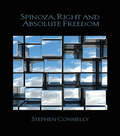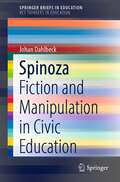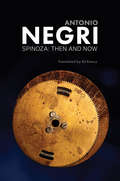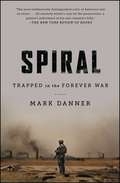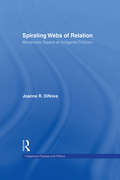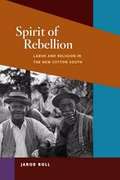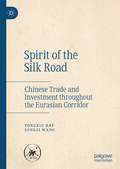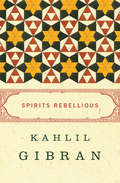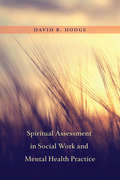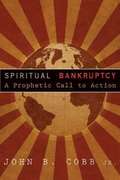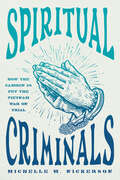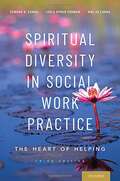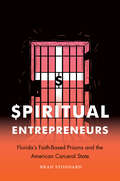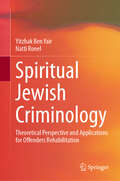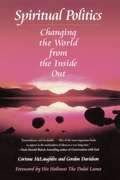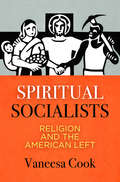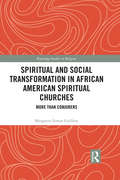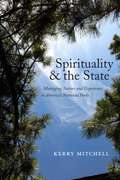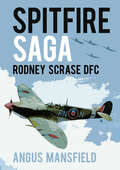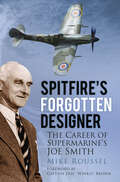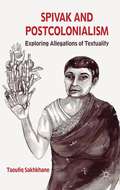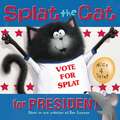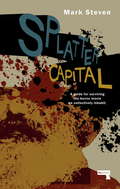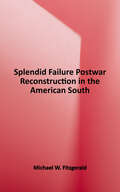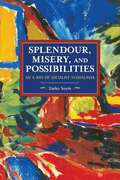- Table View
- List View
Spinoza, Right and Absolute Freedom: Spinoza, Right And Absolute Freedom (Birkbeck Law Press)
by Stephen ConnellyAgainst jurisprudential reductions of Spinoza’s thinking to a kind of eccentric version of Hobbes, this book argues that Spinoza’s theory of natural right contains an important idea of absolute freedom, which would be inconceivable within Hobbes’ own schema. Spinoza famously thought that the universe and all of the beings and events within it are fully determined by their causes. This has led jurisprudential commentators to believe that Spinoza has no room for natural right – in the sense that whatever happens by definition has a ‘right’ to happen. But, although this book demonstrates how Spinoza constructs a system in which right is understood as the work of machines, by fixing right as determinate and invariable, Stephen Connolly argues that Spinoza is not limiting his theory. The universe as a whole is capable of acting only in determinate ways but, he argues, for Spinoza these exist within a field of infinite possibilities. In an analysis that offers much to ongoing attempts to conceive of justice post-foundationally, the argument of this book is that Spinoza opens up right to a future of determinate interventions –as when an engineer, working with already-existing materials, improves a machine. As such, an idea of freedom emerges in Spinoza: as the artful rearrangement of the given into new possibilities. An exciting and original contribution, this book is an invaluable addition, both to the new wave of interest in Spinoza’s philosophy, and to contemporary legal and political theory.
Spinoza: Fiction and Manipulation in Civic Education (SpringerBriefs in Education)
by Johan DahlbeckThis book is a philosophical enquiry into the educational consequences of Spinoza’s political theory. Spinoza’s political theory is of particular interest for educational thought as it brings together the normative aims of his ethical theory with his realistic depiction of human psychology and the ramifications of this for successful political governance. As such, this book aims to introduce the reader to Spinoza’s original vision of civic education, as a project that ultimately aims at the ethical flourishing of individuals, while being carefully tailored and adjusted to the natural limitations of human reason. Readers will benefit from a succinct introduction to Spinoza’s political philosophy and from an account of civic education that is based on careful exegetical work. It draws conclusions only hinted at in Spinoza’s own writings.
Spinoza: Then and Now, Essays
by Antonio NegriThis third and final volume of the series of writings by Antonio Negri examines how Spinoza’s thought constitutes a radical break with past ideas and an essential tool for envisaging a form of politics beyond capitalism. Negri shows how Spinoza’s ideas have facilitated radical renewal from their beginnings to the present day. It was the democratic freedoms and spirit of solidarity fostered in The Netherlands of the 17th century that allowed Spinoza to develop a radically new form of thought, redefining notions of the state and outlining a republican alternative to absolutist monarchy. In our own era, Negri argues that the rediscovery of Spinoza was critical in reinvigorating political theory. Instead of acquiescing to the economic order of capitalism and abandoning the class struggle, Spinoza’s ideas enable us to reconstruct a revolutionary perspective. His treatment of concepts such as multitude, necessity, and liberty have given us new ways of looking critically at our present, revealing that power must always be seen as a question of antagonism and class struggle. The writings that make up this volume – some written from prison as Negri fought for his own freedom – provide an important account of the enduring relevance of Spinoza’s thought. It will be of great interest to students and scholars of philosophy and political theory, as well anyone interested in radical politics today.
Spiral: Trapped in the Forever War
by Mark Danner"[A] chilling cautionary tale of Orwellian repercussions." --Kirkus Reviews Trapped in a forever war by 9/11, in Spiral Mark Danner describes a nation that has been altered in fundamental ways. President Bush declared a war of choice and without an exit plan, and President Obama has proven unable to take the country off what he has called its "permanent war footing."The War on Terror has led to fourteen years of armed conflict, the longest war in America's history. Al Qaeda, the organization that attacked us on 9/11, has been "decimated" (the word is Obama's) but replaced by multiple jihadist and terror organizations, including the most notorious--ISIS. Spiral is what we can call a perpetual and continuously widening war that has put the country in a "state of exception." Bush's promise that we have "taken the gloves off" and Obama's inability to define an end game have had a profound effect on us even though the actual combat is fought by a tiny percentage of our citizens. In the name of security, some of our accustomed rights and freedoms are circumscribed. Guantanamo, indefinite detention, drone warfare, enhanced interrogation, torture, and warrantless wiretapping are all words that have become familiar and tolerated. And yet the war goes badly as the Middle East drowns in civil wars and the Caliphate expands and brutalized populations flee and seek asylum in Europe. In defining the War on Terror as boundless, apocalyptic, and unceasing, we have, Danner concludes, "let it define us as ideological crusaders caught in an endless war."
Spiraling Webs of Relation: Movements Toward an Indigenist Criticism (Indigenous Peoples and Politics)
by Joanne DiNovaThis work builds on indigenous theory as evident in the writing of Willie Ermine, Gregory Cajete, Craig Womack, Jace Weaver, Laurie Anne Whitt, Linda Tuhiwai Smith, Voila Cordova, Dennis McPherson, and others. It works towards a criticism that, in accordance with the precepts of such theory, is community-oriented. It argues for a examination of literature in terms of its function for (or against) the community, in the expansive sense of the term.
Spirit of Rebellion: Labor and Religion in the New Cotton South (The Working Class in American History)
by Jarod RollWinner of the Herbert G. Gutman Prize from the Labor and Working-Class History Association In Spirit of Rebellion, Jarod Roll documents an alternative tradition of American protest by linking working-class political movements to grassroots religious revivals. He reveals how ordinary rural citizens in the south used available resources and their shared faith to defend their agrarian livelihoods amid the political and economic upheaval of the first half of the twentieth century. On the frontier of the New Cotton South in Missouri's Bootheel, the relationships between black and white farmers were complicated by racial tensions and bitter competition. Despite these divisions, workers found common ground as dissidents fighting for economic security, decent housing, and basic health, ultimately drawing on the democratic potential of evangelical religion to wage working-class revolts against commodity agriculture and the political forces that buoyed it. Roll convincingly shows how the moral clarity and spiritual vigor these working people found in the burgeoning Pentecostal revivals gave them the courage and fortitude to develop an expansive agenda of workers' rights by tapping into the powers of existing organizations such as the Socialist Party, the Universal Negro Improvement Association, the NAACP, and the interracial Southern Tenant Farmers' Union.
Spirit of the Silk Road: Chinese Trade and Investment throughout the Eurasian Corridor
by Yongxiu Bai Songji WangThis book is a systematic analysis of the trade interconnectivity, logistics, urbanization, and economic development among countries along the Silk Road. The prospects for cooperation amongst countries on the Silk Road are clarified in a book which will interest scholars of geopolitics, of economic growth, and of China’s Belt and Road Initiative.
Spirits Rebellious: Large Print
by Kahlil GibranA clarion call for freedom from one of the twentieth century&’s most important philosophers and writers, Kahlil Gibran A book so powerful it was burned in the marketplace of Beirut at the time of its publication, Kahlil Gibran&’s Spirits Rebellious is a clarion call for freedom in his homeland of Lebanon—for individuals and society. Gibran&’s bitter denunciation of religious and political injustice flows through his lyric pen in three parables, that of &“Madame Rose Hanie,&” &“The Cry of the Graves,&” and &“Kahlil the Heretic.&” His vision of liberty is no less powerful today.
Spiritual Assessment in Social Work and Mental Health Practice
by Hodge David R.Equips helping professionals with the tools needed to administer spiritual assessments ethically and professionally.
Spiritual Bankruptcy: A Prophetic Call to Action
by John B. Cobb JR.In these times many people feel that their cherished religious values are held hostage by the forces of secularization and that, as a consequence, society is morally bankrupt. While acknowledging this problem, John Cobb overturns the prevailing expectations by drawing a distinction between secularization and secularism. Secularization, as Cobb uses the term, has a prophetic function. It is a process by which religion is cleansed and refocused on mission and ministry rather than on other-worldly myths and concerns. The uncritical understanding of religion that focuses on religion for its own sake is what Cobb calls secularism. In Cobb’s view, secularization has led to secularism or a culture of consumerism that threatens those very religious convictions many hold dear. After teasing the concepts of secularization and secularism apart, Cobb proposes an alternate path for secularization that will help us reevaluate our relation to our world and each other.
Spiritual Criminals: How the Camden 28 Put the Vietnam War on Trial
by Michelle M. NickersonA surprising look at the 28 Catholic radicals who raided a draft board in 1971—and got away with it. When the FBI arrested twenty-eight people in connection to a break-in at a Camden, New Jersey, draft board in 1971, the Bureau celebrated. The case should have been an easy victory for the department—the perpetrators had been caught red-handed attempting to destroy conscription documents for draftees into the Vietnam War. But the results of the trial surprised everyone, and in the process shook the foundations of American law, politics, and religion. In Spiritual Criminals, Michelle M. Nickerson shares a complex portrait of the Camden 28, a passionate group of grassroots religious progressives who resisted both their church and their government as they crusaded against the Vietnam War. Founded by priests, nuns, and devout lay Catholics, members of this coalition accepted the risks of felony convictions as the cost of challenging the nation’s military-industrial complex and exposing the illegal counterintelligence operations of the FBI. By peeling away the layers of political history, theological traditions, and the Camden 28’s personal stories, Nickerson reveals an often-unseen spiritual side of the anti-war movement. At the same time, she probes the fractures within the group, detailing important conflicts over ideology, race, sex, and gender that resonate in the church and on the political Left today.
Spiritual Diversity In Social Work Practice: The Heart Of Helping
by Edward R. Canda Leola Dyrud Furman Hwi-Ja CandaSocial workers and helping professionals serve many people who draw upon religion and spirituality to find meaning, thrive, and overcome oppression and obstacles in their lives. The third edition of Spiritual Diversity in Social Work Practice provides a comprehensive framework of values, knowledge, and skills for spiritually sensitive and culturally appropriate practice with diverse religious and non-religious clients. This classic text contains forty different case examples and stories that vividly illustrate the professional values and ethical principles that guide spiritually sensitive practice. Learning activities at the end of each chapter encourage readers' personal and professional development through self-reflection, dialogue, creative expression, outreach to the community, and skill application. The book also draws connections between spiritual and cultural diversity, gender, and LGBTQI issues. It introduces beliefs, values, and social welfare applications of Buddhism, Christianity, Confucianism, Hinduism, Indigenous spiritual perspectives, Islam, Judaism, Existentialism, and Transpersonal and Deep Ecological Theories. Skills for spiritual assessment and spiritually sensitive practices include mindfulness, meditation, ritual and ceremony, forgiveness, spiritually sensitive administration, and engagement with community-based spiritual support systems. For social workers and other professional helpers committed to supporting the spiritual care of individuals, families, and communities, this definitive guide offers state-of-the-art interdisciplinary and international insights as well as practical tools that students and practitioners alike can put to immediate use.
Spiritual Entrepreneurs: Florida's Faith-Based Prisons and the American Carceral State (Where Religion Lives)
by Brad StoddardThe overall rate of incarceration in the United States has been on the rise since 1970s, skyrocketing during Ronald Reagan's presidency, and recently reaching unprecedented highs. Looking for innovative solutions to the crises produced by gigantic prison populations, Florida's Department of Corrections claims to have found a partial remedy in the form of faith and character-based correctional institutions (FCBIs). While claiming to be open to all religious traditions, FCBIs are almost always run by Protestants situated within the politics of the Christian right. The religious programming is typically run by the incarcerated along with volunteers from outside the prison. Stoddard takes the reader deep inside FCBIs, analyzing the subtle meanings and difficult choices with which the incarcerated, prison administrators, staff, and chaplains grapple every day. Drawing on extensive ethnographic research and historical analysis, Brad Stoddard argues that FCBIs build on and demonstrate the compatibility of conservative Christian politics and neoliberal economics.Even without authoritative data on whether FCBIs are assisting rehabilitation and reducing recidivism rates, similar programs are appearing across the nation—only Iowa has declared them illegal under non-establishment-of-religion statutes. Exposing the intricate connections among incarceration, neoliberal economics, and religious freedom, Stoddard makes a timely contribution to debates about religion's role in American society.
Spiritual Jewish Criminology: Theoretical Perspective and Applications for Offenders Rehabilitation
by Natti Ronel Yitzhak Ben YairThis book presents the concept of Spiritual Jewish criminology. It stems from the Jewish spiritual paradigm, and explains criminology from this point of view in theoretical and applied perspectives. This volume uses qualitative methodology and a phenomenological, hermeneutic approach that enables a combination of interviews and analysis of scriptural texts. Spiritual criminology topics covered from the Spiritual Jewish perspective include: References to life purpose. Human nature and tendencies. Freedom of choice. Corresponding perception of punishment and rehabilitation. This volume suggests theoretical and practical implications to the field of criminology, and although based on Jewish premises, presents in a way that can benefit different belief systems. It is ideal for professionals interested in the intersection of spirituality and criminology.
Spiritual Politics: Changing the World from the Inside Out
by Corinne Mclaughlin Gordon DavidsonDo you need a source of hope for the future? Do you wonder about the hidden, metaphysical causes of crises today? Is there a link between human thought, collective karma and world events such as natural disasters? This groundbreaking book will reveal many of these secrets, including the invisible government, the divine guidance behind America's founding and the soul of each nation. It will give you spiritual tools to create a better world. You’ll find many practical examples of a new evolutionary politics today and innovative public policies –even in Washington D. C. ! “A fascinating and involving study of the cosmic, karmic and etheric dimensions of politics, world affairs and current events… Information-intensive and chock full of empowering suggestions, intriguing stories and uplifting examples of how individuals and groups can make an impact, this thought-provoking assemblage is an enriching, mind-opening book for seekers of spiritual wisdom and political solutions. ” —Publishers Weekly
Spiritual Socialists: Religion and the American Left
by Vaneesa CookRefuting the common perception that the American left has a religion problem, Vaneesa Cook highlights an important but overlooked intellectual and political tradition that she calls "spiritual socialism." Spiritual socialists emphasized the social side of socialism and believed the most basic expression of religious values—caring for the sick, tired, hungry, and exploited members of one's community—created a firm footing for society. Their unorthodox perspective on the spiritual and cultural meaning of socialist principles helped make leftist thought more palatable to Americans, who associated socialism with Soviet atheism and autocracy. In this way, spiritual socialism continually put pressure on liberals, conservatives, and Marxists to address the essential connection between morality and social justice.Cook tells her story through an eclectic group of activists whose lives and works span the twentieth century. Sherwood Eddy, A. J. Muste, Myles Horton, Dorothy Day, Henry Wallace, Pauli Murray, Staughton Lynd, and Martin Luther King, Jr. spoke and wrote publicly about the connection between religious values and socialism. Equality, cooperation, and peace, they argued, would not develop overnight, and a more humane society would never emerge through top-down legislation. Instead, they believed that the process of their vision of the world had to happen in homes, villages, and cities, from the bottom up.By insisting that people start treating each other better in everyday life, spiritual socialists transformed radical activism from projects of political policy-making to grass-roots organizing. For Cook, contemporary public figures such as Senator Bernie Sanders, Pope Francis, Reverend William Barber, and Cornel West are part of a long-standing tradition that exemplifies how non-Communist socialism has gained traction in American politics.
Spiritual and Social Transformation in African American Spiritual Churches: More than Conjurers (Routledge Studies in Religion)
by Margarita Simon GuilloryAt the core of African American religion’s response to social inequalities has been a symbiotic relationship between socio-political activism and spiritual restoration. Drawing on archival material and ethnographic fieldwork with African American Spiritual Churches in the USA, this book examines how their spiritual and social work can shed light on the interplay between corporate activism and individual spirituality. This book traces the development of this "politico-spiritual" approach to injustice from the beginning of the twentieth century through the opening decade of the twenty-first century, using the work of African American Spiritual Churches as a lens through which to observe its progression. Addressing subjects such as spiritual healing, support of the homeless, gender equality and the aftermath of hurricane Katrina, it demonstrates that these communities are clearly motivated by the dual concerns of the soul and the community. This study diversifies our understanding of the African American religious landscape, highlighting an approach to social injustice that conjoins both political and spiritual transformations. As such, it will be of significant interest to scholars of religious studies, African American studies and politics.
Spirituality and the State: Managing Nature and Experience in America's National Parks (North American Religions)
by Kerry MitchellAn exploration of the production and reception of nature and spirituality in America’s national park systemAmerica’s national parks are some of the most powerful, beautiful, and inspiring spots on the earth. They are often considered “spiritual” places in which one can connect to oneself and to nature. But it takes a lot of work to make nature appear natural. To maintain the apparently pristine landscapes of our parks, the National Park Service must engage in traffic management, landscape design, crowd-diffusing techniques, viewpoint construction, behavioral management, and more—and to preserve the “spiritual” experience of the park, they have to keep this labor invisible.Spirituality and the State analyzes the way that the state manages spirituality in the parks through subtle, sophisticated, unspoken, and powerful techniques. Following the demands of a secular ethos, park officials have developed strategies that slide under the church/state barrier to facilitate deep connections between visitors and the space, connections that visitors often express as spiritual. Through indirect communication, the design of trails, roads, and vista points, and the management of land, bodies and sense perception, the state invests visitors in a certain way of experiencing reality that is perceived as natural, individual, and authentic. This construction of experience naturalizes the exercise of authority and the historical, social, and political interests that lie behind it. In this way a personal, individual, nature spirituality becomes a public religion of a particularly liberal stripe. Drawing on surveys and interviews with visitors and rangers as well as analyses of park spaces, Spirituality and the State investigates the production and reception of nature and spirituality in America’s national park system.
Spitfire Saga: Rodney Scrase DFC
by Angus MansfieldRODNEY SCRASE’s life in the RAF began in an old airship shed when he took the King’s shilling in May 1941. He learnt to fly at a British Flying Training School in America and went on to fly Spitfires with Nos 72 and 1 Squadrons, and was awarded the Distinguished Flying Cross in 1944. He was released from service with a record of four enemy aircraft destroyed and three damaged, having taken part in the invasions of North Africa, Sicily and Italy, following up with a stint as an instructor in the art of air-to-air gunnery in Egypt. He finished the war flying escort missions with No. 1 Squadron from Manston, Kent. In Spitfire Saga Angus Mansfield presents the unique story of one man’s experience of flying the most iconic aircraft of the Second World War, using Rodney’s own logbooks and first-hand interviews with him and several other pilots. Complete with thorough historical context and a selection of Rodney’s personal photographs, this book is an excellent addition to any history enthusiast’s library. A true insider’s view of life as an RAF fighter pilot.
Spitfire's Forgotten Designer: The Career of Supermarine's Joe Smith
by Eric Brown Mike RousselThe Supermarine Spitfire was a classic design, well known for its efforts in defending British shores during the Second World War. However, while Reginald Mitchell is rightly celebrated for his original design of the Spitfire, the role of Joe Smith in the development of the Spitfire is often overlooked. Smith was an integral member of the design team from the earliest days, and on Mitchell’s death in 1937 he was appointed design office manager before becoming chief designer. Smith’s dedicated leadership in the development of the Spitfire during the war, as well as his efforts on post-war jet aircraft, deserve their place in history. Charting the fascinating history of Supermarine from 1913 to 1958, when the company ceased its operations in Southampton, shortly after Joe Smith’s death in 1956, this book tells its story through the eyes of apprentices and many other members of Smith’s team. Marvellous photographs add to the sense of what it was like to work under Joe Smith at the drawing boards of one of Britain’s most famous wartime aviation manufacturers.
Spivak and Postcolonialism
by Taoufiq SakhkhaneExploring, amongst other themes, representations of the other, strategies adopted to resist such representations, the issues of identity, nationalism, colonialism, feminism, subaltern studies and the English language within the context of Empire, this book projects a study of post-colonialism through the work of Gayatri Chakravorty Spivak.
Splat the Cat for President (I Can Read)
by Rob ScottonSplat is thrilled to be elected student-body president, until he discovers not everyone likes his plans. So he thinks big. Real big. So big that pretty soon he’s making promises he cannot keep. Can Splat please everyone and also make a difference?
Splatter Capital
by Mark StevenSplatter Capital shows how a popular subgenre of cinematic horror has developed a uniquely sensitive perspective on the cycles of capitalism. It argues that the emphatically messy brand of horror mobilized in gore or "splatter" films is extremely responsive to the internal contradictions that threaten the future sustainability of capitalist accumulation. And, while responding to the prospect of that end, splatter promotes an extant truth: capitalist accumulation is and always has been a nightmare of systematized bloodshed. This book provides an account of that nightmare as told through a combination of economic history and filmic analysis. The story it tells will serve as a source of both theoretical and practical knowledge for surviving the horror movie we collectively inhabit.
Splendid Failure: Postwar Reconstruction in the American South (American Ways Ser.)
by Michael W. FitzgeraldSince the civil rights era of the 1960s, revisionist historians have been sympathetic to the racial justice motivations of the Radical Republican Reconstruction policies that followed the Civil War. But this emphasis on positive goals and accomplishments has obscured the role of the Republicans in the overthrow of their own program. Rich with insight, Michael W. Fitzgerald's new interpretation of Reconstruction shows how the internal dynamics of this first freedom movement played into the hands of white racist reactionaries in the South. Splendid Failure recounts how postwar financial missteps and other governance problems quickly soured idealistic Northerners on the practical consequences of the Radical Republican plan, and set the stage for the explosion that swept Southern Republicans from power and resulted in Northern acquiescence to the bloody repression of voting rights. The failed strategy offers a chastening example to present-day proponents of racial equality.
Splendour, Misery, and Possibilities: An X-Ray of Socialist Yugoslavia
by Darko SuvinThe Socialist Federal Republic of Yugoslavia was created in a surge of revolutionary self-determination that rejected both the free-market-Capitalism of Europe, and the bureaucratic-Socialism of the Soviet Union. Yet this early experimentation and dynamism ultimately gave way to the same sclerotic state-system its creators were trying to avoid. In this engaging treatise, Suvin seeks out the source of this failure.
